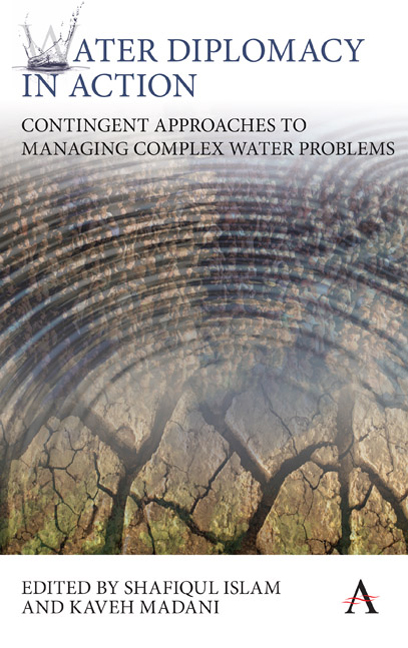Book contents
- Frontmatter
- Contents
- List of Figures
- List of Tables
- The Blind Men, the Elephant and the Well: A Parable for Complexity and Contingency
- Preface
- Part I ROOTS AND CAUSES OF COMPLEXITY AND CONTINGENCY IN WATER PROBLEMS
- Part II TOOLS, TECHNIQUES, MODELS AND ANALYSES TO RESOLVE COMPLEX WATER PROBLEMS
- Part III CASE STUDIES
- Notes on Contributors
- Index
The Blind Men, the Elephant and the Well: A Parable for Complexity and Contingency
Published online by Cambridge University Press: 10 January 2018
- Frontmatter
- Contents
- List of Figures
- List of Tables
- The Blind Men, the Elephant and the Well: A Parable for Complexity and Contingency
- Preface
- Part I ROOTS AND CAUSES OF COMPLEXITY AND CONTINGENCY IN WATER PROBLEMS
- Part II TOOLS, TECHNIQUES, MODELS AND ANALYSES TO RESOLVE COMPLEX WATER PROBLEMS
- Part III CASE STUDIES
- Notes on Contributors
- Index
Summary
In the early 1970s, the leading cause of childhood mortality in Bangladesh was diarrheal disease (Smith, Lingas and Rahman 2000; Anthamatten and Hazen 2012). Due to inadequate sanitation infrastructure, the untreated surface water that the majority of the population used for their daily needs was contaminated with a variety of disease- causing agents including Vibrio cholerae, rotavirus and Escherichia coli, among others (Hoque et al. 1996; Alam et al. 2006; Begum et al. 2007; Hashizume et al. 2008).
The underdeveloped immune systems of children below five years make them particularly susceptible to death from diarrheal disease. To address this issue, the United Nations Children's Fund (UNICEF) initiated a project in 1972 to build shallow tube wells that tapped into local groundwater aquifers (Smith, Lingas and Rahman 2000). Such tube wells are not as vulnerable to contamination as are surface water sources, which made them a seemingly ideal solution for the problem at hand.
By 1980, one million tube wells had been installed— a number that then grew tenfold in the decade that followed, bringing coverage to nearly the entirety of the Bangladeshi population in the process (Jones et al. 2008; Smith, Lingas and Rahman 2000; Chappell, Abernathy and Calderon 2001). As under- five mortality began to fall as a result of UNICEF's shallow tube well project, the wells themselves became status symbols in the communities they served (Anthamatten and Hazen 2012; Sultana 2007, 2013). In fact, they became so intertwined with Bangladeshi cultural practices that many families even began to include them in their daughters’ dowries. At the time, UNICEF did not know that the same wells that prevented diarrheal disease so effectively in these rural Bangladeshi communities were also the cause of arsenic poisoning.
Shallow tube wells, which draw water from within a depth of 150 meters from the surface, are prone to arsenic contamination from metal deposits in the surrounding soils (Smith, Lingas and Rahman 2000). Unfortunately, arsenic poisoning— or arsenicosis— has a latency period that can be as long as 20 years (Martinez et al. 2011). By the time symptoms started to appear in the 1980s, tube wells had already become the primary water source for millions of Bangladeshis— resulting in what the WHO has since called “the largest mass poisoning of a population in history” (Smith, Lingas and Rahman 2000).
- Type
- Chapter
- Information
- Water Diplomacy in ActionContingent Approaches to Managing Complex Water Problems, pp. xiii - xviPublisher: Anthem PressPrint publication year: 2017



